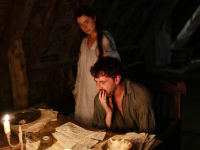
 Anyone who’s taken notice will know that PJ Harvey’s latest album has had a fairly public gestation, whilst managing to remain a thing of mystery too. Travels to Afghanistan and Kosovo with a photographer in tow has helped produce an album of songs painted by global politics, war and poverty that has already been preceded by a poetry and poems book (The Hollow of the Hand) and an unusual ‘watch as they record’ installation in London’s Somerset House involving an audience hidden by one-way glass.
Anyone who’s taken notice will know that PJ Harvey’s latest album has had a fairly public gestation, whilst managing to remain a thing of mystery too. Travels to Afghanistan and Kosovo with a photographer in tow has helped produce an album of songs painted by global politics, war and poverty that has already been preceded by a poetry and poems book (The Hollow of the Hand) and an unusual ‘watch as they record’ installation in London’s Somerset House involving an audience hidden by one-way glass.
Following an increasingly singular and non-commercial path since 2000’s Stories from the City, Stories from the Sea has not harmed PJ Harvey’s success. She’s a musician that produces art that the public seem to love to tap into. That album won the 2001 Mercury Prize and coming full circle her last album Let England Shake (2011) made her the first to ever win a second Mercury Prize.
The album kicks off with The Community of Hope, a song about a run down American suburb. If it’s pretty straightforward rock’n’roll, then the following The Ministry of Defence is far more in your face, a pounding repeated full band riff, massed vocal choruses, paraphrasing from Linton Kwesi Johnson and dissonant saxophone wailing with a closing shot of “This is how the world will end”. It’s heavy, unflinching, a militaristic romp and very impressive.

The Hope Six Demolition Project is the ninth studio album from PJ Harvey
A Line in the Sand starts with a Tom Waits-like resemblance of music and is a grim recollection of a visit to a refugee camp “I saw people kill each other just to get there first” tells you the impression the scene made on Harvey, and her belief that the future is there to achieve something good is where she draws her line in the sand. Chain of Keys is built upon a bed of artillery drumming, flat baritone saxophones and a tale of a shattered old woman who has seen things that have broken her faith in everything. River Anacostia (the river from Maryland into Washington) is a lower key simpler song built on a pulsing synth riff. There’s an underlying spiritual feel but no hope is offered, the message left is “what will become of us?” Near the Memorials to Vietnam and Lincoln takes us deeper into Washington, a pretty simple anti-rock song with a ghostly feel, it builds into a harsh, hot-and-bothered, abrupt finish. The Orange Monkey explains the meat of the album: “I took a plane to a foreign land, and said, I’ll write down what I find.”
Medicinals takes the uncompromising approach further. Sung almost in nursery rhyme style over a percussive sax bled under bed, it’s another song of loss and no hope. The Ministry of Social Affairs starts on a sample of old blues which is seamlessly woven into the bands pounding, marching music and contrasts a scene of broken, injured and sick people living within a major city and inhabiting the same streets as big money-men that seem not to care about the poverty that walls their castles of prosperity. The song closes on dissonant saxophones grinding to a halt and is barely over before the jungle beat of The Wheel crashes in, weeping for the lost children of a war-torn country, “Now you see them, now you don’t, I heard it was twenty-eight thousand” is as harsh a lyrical refrain you could want to hear in a rock and roll song. This is music that paints a very visual image. It’s a song that was its albums leadoff single. When an artist is given the freedom to create without the need to cater towards the hit parade then great things can happen. And that’s where PJ Harvey is, she follows her own path, bares her own soul, and people seem to love it. It’s why I love music, there’s no concession to product here, just creation, artistry, and emotion. The closing Dollar, Dollar shows this perfectly. Harvey sings a tale of how she was left haunted by a beggar boy as she sped away in traffic unable to help despite the attention he garnered.
What a great record. Musically there’s been little like it. It reminds me of late Bowie, with the stories it tells and the baritone saxes that dominate its mood, reminiscent of the great man’s comeback on The Next Day, even a sprinkling of Scary Monsters guitars in places under the relentless percussive, almost drone like feel of this album. Not that Harvey’s aping anyone else on this record. This album is without apology a Polly Jean Harvey record par excellence.

Author: Ian, Romford store





